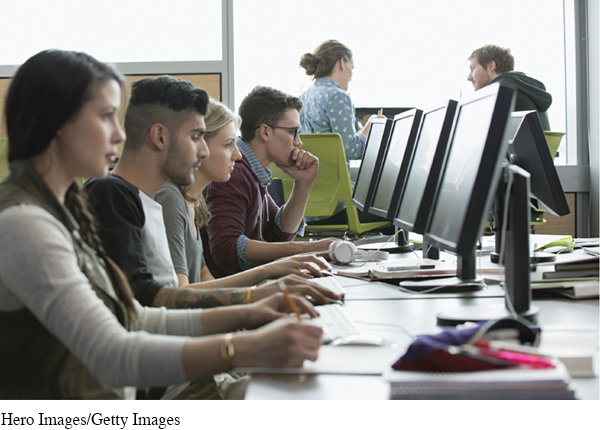9.1 INFORMATION LITERACY
Information literacy, the number one job skill demanded by most twenty-first-century employers, is the ability to find, interpret, and use information to meet your needs; it includes computer literacy, media literacy, and cultural literacy:
Computer literacy is the ability to use electronic tools for conducting searches and for communicating and presenting to others what you have found and analyzed. This ability involves using different computer programs, digital video and audio tools, and social media.
Media literacy is the ability to think deeply about what you see and read through both the content and context of television, film, advertising, radio, magazines, books, and the Internet.
Cultural literacy is knowing what has gone on and is going on around you in society. You have to understand the difference between the American Civil War and the Revolutionary War, U2 and YouTube, Eminem and M&Ms so that you can keep up with everyday conversations and with your college reading material.
Information matters. It helps people make good choices. The choices people make often determine their success in careers, their happiness as friends and family members, and their well-being as citizens of our planet.
YOUR TURN > DISCUSS IT

In a small group, discuss how information literacy can contribute to people’s success in today’s world.

Learning to Be Information Literate
People are amazed at the amount of information available to them everywhere, especially online. Many think that because they checked out some links they found on a search engine, they are informed or can easily become informed. Most of us, though, are unprepared for the number of available sources and the amount of information that we can find at the press of a button. What can we do about information overload? To become an informed and successful user of information, keep three basic goals in mind:
Know how to find the information you need. Once you have figured out where to look for information, you’ll need to ask good questions and learn how to search information systems, such as the Internet, libraries, and databases. You’ll also want to get to know your college librarians who can help you ask questions, decide what sources you need to investigate, and find the information you need.
Learn how to interpret the information you find. It is important to find information, but it is even more important to make sense of that information. What does the information mean? Have you selected a source you can understand? Is the information correct? Can the source be trusted?
Have a purpose for collecting information and then do something with it once you have it. Even the best information won’t do much good if you don’t know what to do with it. True, sometimes you’ll hunt down a fact simply to satisfy your own curiosity. But more often, you’ll communicate what you’ve learned to someone else. First you should decide how to put your findings into an appropriate format such as a research paper for a class or a presentation at a meeting. Then you need to decide what it is that you want to accomplish. Will you use the information to make a decision, solve a problem, share an idea, prove a point, or something else?
In this chapter we’ll explore ways to work toward each of these goals—doing so is really what college is all about.
Research: What It Is and What It Isn’t
In the past, you might have completed assignments that asked you to find a book, journal article, or Web page related to a particular topic. While finding information is an essential part of research, it’s just one step, not the end of the road. Research is not just copying a paragraph from a book or putting together bits and pieces of information without adding any of your own comments. In fact, such behavior could easily be considered plagiarism, a form of cheating that could result in a failing grade or worse (plagiarism is discussed later in this chapter). At the very least, repeating information or ideas without thinking about or interpreting them puts you at risk of careless use of old, incorrect, or one-sided resources.
Research is a process that includes steps used to collect and analyze information to increase understanding of a topic or issue. Those steps are asking questions, collecting and analyzing data related to those questions, and presenting one or more answers. Good research is information literacy in action. If your instructor asks you to select and report on a topic, you might search for information about it, find a dozen sources, evaluate them, interpret them, select a few and remove a few, organize the ones you wish to keep, select related portions, write a paper or prepare a presentation that cites your sources, write an introduction that explains what you have done, draw some conclusions of your own, and submit the results. That’s research—the conclusion that you make based on your research is new information. It takes determination and persistence to go through all the steps that good research requires. Some steps will be difficult and time-consuming, and you might be tempted to take shortcuts. Learning to persist at these kinds of tasks and processes in college will pay off in your career as this kind of work will come more easily to you, and you will be more successful.